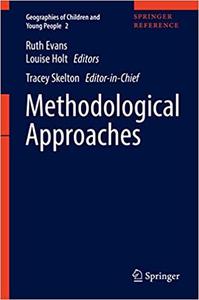
Ruth Evans, Louise Holt, Tracey Skelton, "Methodological Approaches"
English | 2017 | pages: 468 | ISBN: 9812870199 | PDF | 7,4 mb
This volume presents the innovative methodologies, tools and techniques, as well as the challenges and ethical complexities of doing geographies of young people. Geographers of young people have reflected upon participation, power and how to approach young people, generating a vibrant and exciting methodological terrain, which this volume showcases. Understanding young people's lives has challenged researchers to be creative in their research approaches. Facilitating research with, and alongside, young people and acknowledging, and endeavouring to address, adult-child power imbalances has prompted innovation, experimentation and adaptation which has applicability to all social scientists and geographers. The volume provides critical insights into underlying epistemological and ethical debates, along with practical methods and techniques that investigate young people's geographies globally, across both majority and minority worlds. Many of the chapters consider how to facilitate participation and empowerment through the research process, and geographies of young people have a long tradition of co-production and participation in research. The collection is structured into three sections with a focus on: methodological approaches and ethics; methods, tools and techniques; co-production, participation and power. In the first section, key epistemological and methodological approaches are considered, such as critical realism, and critical pedagogy, with discussion of their implications for research design and analysis. In the second section, chapters explore the potential and challenges of a variety of innovative participatory tools: mobile technologies, geospatial methods, creative visual methods, participatory video. In the third section, chapters reflect on endeavours to promote more empowering, co-productive research including rights-based research, young people as researchers, and community engagement with young people. The collection highlights the specific methodological and ethical issues raised by relatively neglected techniques, such as archival research, autoethnography, qualitative longitudinal research and mobile interviewing. It addresses how barriers to participation with groups who are often more silenced and marginalised can be addressed, such as when conducting research with migrant and asylum seeking children in the minority world and with street youth and disabled young people in the majority world. The volume explores issues of data analysis, interpretation and dissemination, such as interpreting visual ethnography and the process of participatory dissemination.
Buy Premium From My Links To Get Resumable Support,Max Speed & Support Me
Links are Interchangeable - No Password - Single Extraction



